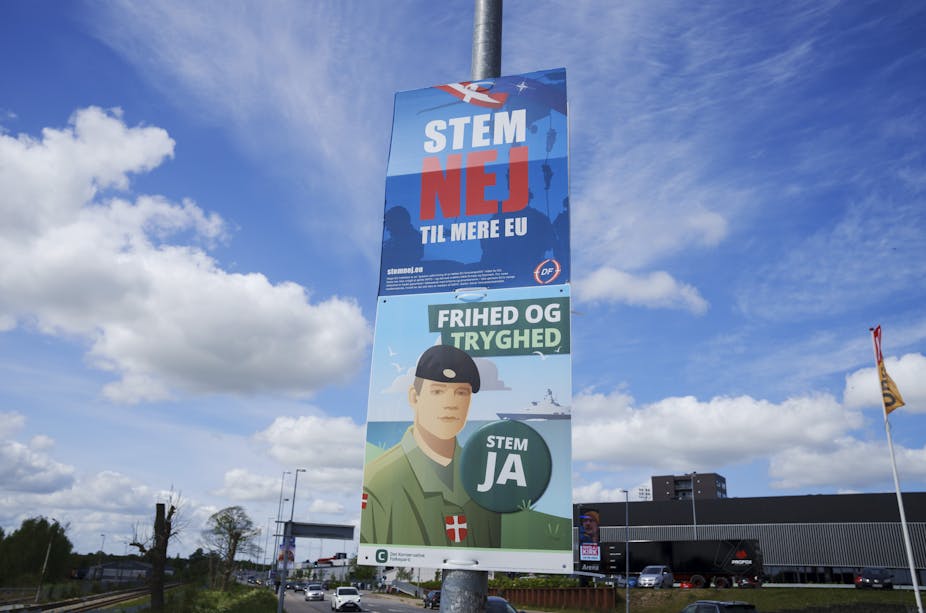On June 1, voters in Denmark will take part in a referendum on whether to end the country’s opt-out from EU defence policy, which prohibits Denmark from participating in EU defence matters. This means that when the EU deploys personnel under its common security and defence policy, Denmark participates in civilian but not military operations.
This was one of four arrangements secured when Danes voted “no” to the 1992 Maastricht treaty to establish the EU. Along with defence policy, Denmark opted out of the euro, justice and home affairs. The European Council also agreed to a Danish declaration that EU citizenship could only ever complement national citizenship – not replace it. These four arrangements for Denmark persuaded voters to support the Maastricht treaty in a second referendum in 1993.
The citizenship arrangement later became the norm for all member states through the 1997 Amsterdam treaty, which ratified that EU citizenship is supplementary to citizenship of a member state and cannot replace it.
The decision to hold a vote on the defence opt-out reveals a deeper shift in EU constitutional politics. Faced with contentious issues, governments are increasingly turning to single-issue referendums.
Russia’s invasion of Ukraine in February 2022 changed the security situation in Europe in a heartbeat. Finland and Sweden previously opted to remain outside Nato but have now submitted applications. Denmark, a founding member of Nato, is now forced to rethink its foreign policy, including its arm’s-length relationship with the EU.
Faced with a war on its eastern border, and the arrival of more than four million Ukrainian refugees, the EU has agreed to supply lethal weapons to Ukraine – the first time it has done so for any country. EU member states also agreed to commit up to 5,000 troops to a new rapid reaction force, and to engage in live exercises on land and sea. This is part of a new strategy to make the EU a stronger military actor.
Denmark cannot participate in such efforts, potentially leaving it more vulnerable to external threats than most EU member states. The EU’s mutual defence clause guarantees aid and assistance from other member states when one is subject to aggression. It remains unclear the extent to which Denmark can invoke or benefit from that provision, given its special status.
A coalition of four Danish political parties proposed the referendum in March, calling on Danes to reverse the opt-out. If the Danish people vote to remove the opt-out, Denmark will be able to fully participate in EU military operations and cooperate on the growth of EU military capabilities, while also growing its own military budget. If the people vote no, Denmark will remain outside EU defence policy, which will continue to develop without it.
Single issue referendums
In the past, national governments primarily looked to national parliaments to approve changes to their countries’ relationship with the EU. But persistent problems of public trust in both governments and parliaments make it difficult for these institutions alone to give their consent to EU policies and questions of European integration.
Since 1972, nearly 50 referendums have been held on issues relating to the EU, the most common being treaty revision or a decision to join the EU. Our research shows the growing importance of single-issue referendums focused on specific policies or questions about European integration. Member states are rarely obliged to hold single-issue referendums. They choose to do so when the way they usually engage with the EU is under strain. Examples include Greece’s 2015 referendum on negotiations with the EU and International Monetary Fund, Hungary’s 2016 referendum on the relocation of refugees and the UK’s 2016 vote to leave the EU.
After Denmark secured its four opt-outs from elements of the Maastricht treaty, the political consensus was that a referendum would be required to opt into any of these areas. This was not a legal but a political requirement – and it established single-issue referendums as integral to how Denmark participates in the EU.

So far, two opt-in referendums have been held in Denmark, but have not resulted in change. In 2000, voters rejected joining the euro despite widespread support from political parties and trade union leaders.
In 2015, a referendum on ending the country’s opt-out from EU justice and home affairs also ended in defeat.
Voting against the government
Denmark is no isolated case. Of the six single-issue EU referendums called by governments since 2000, four went against the preferences of the government. And Hungary’s controversial refugee relocation referendum resulted in the “no” vote that the government sought, but failed to secure the required turnout. Greece’s government won a “no” vote against the terms of financial assistance from its international creditors, but this made little practical difference to negotiations.
This makes Denmark’s upcoming referendum politically fraught, with polls giving the “yes” side an unconvincing lead, given the large share of undecideds. The fact that four political parties have proposed the referendum means it will not simply be a vote on the popularity of the government. It will also be on the single issue of whether voters think the security situation has changed enough to allow “more EU” in Denmark.
The Danish government has already promised that should the EU seek to establish a supranational army, there would be yet another referendum to decide whether Denmark would participate. Whatever the result, single-issue referendums will remain a feature of EU constitutional politics.

